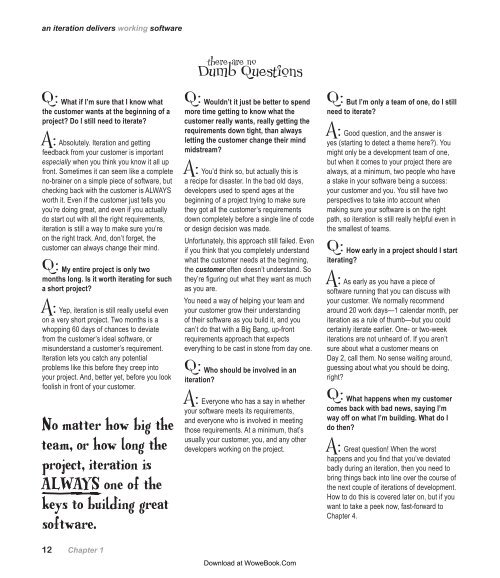Software Development Cross Solution - Index of - Free
Software Development Cross Solution - Index of - Free
Software Development Cross Solution - Index of - Free
You also want an ePaper? Increase the reach of your titles
YUMPU automatically turns print PDFs into web optimized ePapers that Google loves.
an iteration delivers working s<strong>of</strong>tware<br />
Q: What if I’m sure that I know what<br />
the customer wants at the beginning <strong>of</strong> a<br />
project? Do I still need to iterate?<br />
A: Absolutely. Iteration and getting<br />
feedback from your customer is important<br />
especially when you think you know it all up<br />
front. Sometimes it can seem like a complete<br />
no-brainer on a simple piece <strong>of</strong> s<strong>of</strong>tware, but<br />
checking back with the customer is ALWAYS<br />
worth it. Even if the customer just tells you<br />
you’re doing great, and even if you actually<br />
do start out with all the right requirements,<br />
iteration is still a way to make sure you’re<br />
on the right track. And, don’t forget, the<br />
customer can always change their mind.<br />
Q: My entire project is only two<br />
months long. Is it worth iterating for such<br />
a short project?<br />
A: Yep, iteration is still really useful even<br />
on a very short project. Two months is a<br />
whopping 60 days <strong>of</strong> chances to deviate<br />
from the customer’s ideal s<strong>of</strong>tware, or<br />
misunderstand a customer’s requirement.<br />
Iteration lets you catch any potential<br />
problems like this before they creep into<br />
your project. And, better yet, before you look<br />
foolish in front <strong>of</strong> your customer.<br />
No matter how big the<br />
team, or how long the<br />
project, iteration is<br />
ALWAYS one <strong>of</strong> the<br />
keys to building great<br />
s<strong>of</strong>tware.<br />
12 Chapter 1<br />
Q: Wouldn’t it just be better to spend<br />
more time getting to know what the<br />
customer really wants, really getting the<br />
requirements down tight, than always<br />
letting the customer change their mind<br />
midstream?<br />
A: You’d think so, but actually this is<br />
a recipe for disaster. In the bad old days,<br />
developers used to spend ages at the<br />
beginning <strong>of</strong> a project trying to make sure<br />
they got all the customer’s requirements<br />
down completely before a single line <strong>of</strong> code<br />
or design decision was made.<br />
Unfortunately, this approach still failed. Even<br />
if you think that you completely understand<br />
what the customer needs at the beginning,<br />
the customer <strong>of</strong>ten doesn’t understand. So<br />
they’re figuring out what they want as much<br />
as you are.<br />
You need a way <strong>of</strong> helping your team and<br />
your customer grow their understanding<br />
<strong>of</strong> their s<strong>of</strong>tware as you build it, and you<br />
can’t do that with a Big Bang, up-front<br />
requirements approach that expects<br />
everything to be cast in stone from day one.<br />
Q: Who should be involved in an<br />
iteration?<br />
A: Everyone who has a say in whether<br />
your s<strong>of</strong>tware meets its requirements,<br />
and everyone who is involved in meeting<br />
those requirements. At a minimum, that’s<br />
usually your customer, you, and any other<br />
developers working on the project.<br />
Download at WoweBook.Com<br />
Q: But I’m only a team <strong>of</strong> one, do I still<br />
need to iterate?<br />
A: Good question, and the answer is<br />
yes (starting to detect a theme here?). You<br />
might only be a development team <strong>of</strong> one,<br />
but when it comes to your project there are<br />
always, at a minimum, two people who have<br />
a stake in your s<strong>of</strong>tware being a success:<br />
your customer and you. You still have two<br />
perspectives to take into account when<br />
making sure your s<strong>of</strong>tware is on the right<br />
path, so iteration is still really helpful even in<br />
the smallest <strong>of</strong> teams.<br />
Q: How early in a project should I start<br />
iterating?<br />
A: As early as you have a piece <strong>of</strong><br />
s<strong>of</strong>tware running that you can discuss with<br />
your customer. We normally recommend<br />
around 20 work days—1 calendar month, per<br />
iteration as a rule <strong>of</strong> thumb—but you could<br />
certainly iterate earlier. One- or two-week<br />
iterations are not unheard <strong>of</strong>. If you aren’t<br />
sure about what a customer means on<br />
Day 2, call them. No sense waiting around,<br />
guessing about what you should be doing,<br />
right?<br />
Q: What happens when my customer<br />
comes back with bad news, saying I’m<br />
way <strong>of</strong>f on what I’m building. What do I<br />
do then?<br />
A: Great question! When the worst<br />
happens and you find that you’ve deviated<br />
badly during an iteration, then you need to<br />
bring things back into line over the course <strong>of</strong><br />
the next couple <strong>of</strong> iterations <strong>of</strong> development.<br />
How to do this is covered later on, but if you<br />
want to take a peek now, fast-forward to<br />
Chapter 4.



